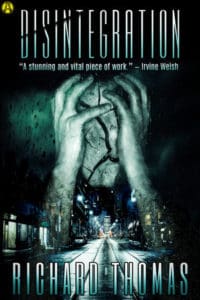One of the questions I often get from my students is, “How do I know when to stop writing?” Or, “How do I know when my story is done?”
How do you know if your hot, new idea is going to be flash fiction, a short story, a novella, or a novel? Here are a few tips to help figure it out.
Format
I just got done writing an epistolary short story of about 2,000 words, “In His House.” It was a lot of fun, but man, it couldn’t have gone much longer. I couldn’t maintain the tight concept, the voice, or subject matter.
That also goes for other experimental fiction that I’ve written in the past—flash fiction. There was “Twenty Reasons to Stay and One to Leave” which was essentially answers to a series of questions. That ended up being about 400 words and still somehow got a Pushcart nomination. I also wrote a “choose-your-own-path” neo-noir thriller, “Splintered.” Fairly complicated to lay out (I used a flow chart!), it clocked in at about 2,500 words.
Yes, I know Bram Stoker’s classic Dracula was high concept, written entirely from diary entries.
For me, maintaining a concept, an experimental format, is something I can’t pull off for too long.
My 1,200-word story, “Undone,” that was just one sentence? Very difficult to maintain. (It’ll be out later this year in the Pantheon anthology, Gorgon: Stories of Emergence.)
Depth
Is there enough meat on the bone? Maybe you have a simple plot with a small cast, and little movement. The action is contained and the emotion and conflicts are not that intense. This may be grist for a short story (which can be anything from 1,001 words to 7,500 words—which is quite a range), but may not have the substance needed for a novel.
When writing, somewhere from within I know how deep this particular story goes. It wants to be 10 or 20 or 30 pages, not 300.
Complexity
Related to depth of story is the complexity of your narrative. Do you have a singular plot, with a few other secondary plots? Do you have a large cast of characters—for example a couple running from a gang of five brothers with a lurking demon and a few supernatural heroes waiting to help your protagonists out? Do you include several different POVs—a split narrative, or maybe something like The Stand, where there are many perspectives? Sounds like you’re headed for a novel.
Is your subject matter tapping not only into racism, but the underlying toxicity of men, the ways minorities are reduced and disappeared, the wonder and innocence lost in childhood? That’s a lot to take on in one short story. Again, sounds like a novel.
My latest novelette, “Ring of Fire,” was based on one of the seven deadly sins—lust. I had to work hard to be original, avoiding the obvious references to Hellraiser and other similar books and films.
I had to avoid anything misogynistic, or “rapey.” You see, my protagonist is a very bad man, but I still had to get readers to root for him, seeing his complexity before the truth is revealed. To be a catalyst for the change needed in this story, he must be deeply disturbed, violent, and unhinged. Add to that a chorus of disembodied voices, a running list of objects that somehow clue you in to the story being told—and yeah, 15,000 words later, I was done.
I needed all that time and space to develop the various threads, to get deep enough for you to care, ample time to use misdirection to fool you several times.
It’s personal
My second novel, Disintegration, came about after I took a class with Jack Ketchum (RIP, brother) where he asked us to write about our worst fears. When writing horror or thrillers, tapping into your own personal demons, worst nightmares, ongoing fears, and sensitive triggers can lead to a deeply personal story on the page. I went down that rabbithole—a man seeing his wife and kids killed in a car accident right in front of him, his life shattering in an instant. It turned into Dexter meets Falling Down. This story was so intense—essentially me trying on the skin of a man who has lost it all, descended into madness, killing the really bad people, as the only way to find justice in a chaotic world—that I broke down and cried when I was done. Writing the last 40,000 words in a feverous rage, I had lived it vicariously. It was a visceral experience that shook me to my core.
Fascination
Passion for your work can keep you up at night doing research, losing all track of time in order to understand the subjects, themes, and topics in your work. For my third novel, Breaker, I wanted to see if a serial killer is made or born—or some combination. I wanted to figure out if his fate could be changed, or if he was destined to be a monster.
It started with a man in a white van, then turned into a touching story about a behemoth named Ray who makes his living in underground “fight clubs.” Ray also watches out for the girl next door, who is battling her own demons—local gangs, absent parents, and that roaming predator. I wanted this story to be a mix of Boo Radley in To Kill a Mockingbird, John Coffey in The Green Mile, and Lenny in Of Mice and Men, with a sprinkling of Leon: The Professional.
One complication that arose was the POV of the neighbor, Natalie. I couldn’t do a split narrative, as she was much more sympathetic than the protagonist and would take over the book. I had it go four chapters with Ray, then one with Natalie. I also shifted from first person to third. This allowed her more authority in her scenes, and gave Ray more intimate moments, the internal stories his complex character needed.
Not only was I passionate about this story, fascinated by the details, but it also turned out to be fairly complex in nature—across plot, structure, theme, and emotion. Breaker was a novel from the get-go.
Story size
If your story is relatively simple, has an experimental format, isn’t very personal, or something you’re knowledgeable about—then you are probably headed for shorter work—flash fiction or short stories. You still need emotion, character, conflict, setting, and resolution—all the things required for longer work.
If it is a deep, complex story with a large cast, multiple narratives, and of a personal nature, something you’re passionate to write about—you may have a novella, or a novel, on your hands. Maybe even a series.
Searching your heart, you should be able to figure out the length of your story. But whatever its word count, put blood, sweat, and tears on the page.

 Richard Thomas is the author of seven books, including Disintegration and Tribulations. The author of more than 140 stories, published in Cemetery Dance, among many other places. He has been nominated for the Bram Stoker, the Shirley Jackson, and an award from the International Thriller Writers. He was the editor of four anthologies. In his spare time, he writes for Lit Reactor and is Editor-in-Chief at Gamut Magazine.
Richard Thomas is the author of seven books, including Disintegration and Tribulations. The author of more than 140 stories, published in Cemetery Dance, among many other places. He has been nominated for the Bram Stoker, the Shirley Jackson, and an award from the International Thriller Writers. He was the editor of four anthologies. In his spare time, he writes for Lit Reactor and is Editor-in-Chief at Gamut Magazine.





